De Vlaamse dichter en essayist Stefaan van den Bremt werd geboren in Aalst op 12 oktober 1941. Zie ook alle tags voor Stefaan van den Bremt op dit blog.
In Newtons boomgaard
Ik wacht tot de appel niet ver
van de boom valt of de zwaarte
ontstijgt. De appel is rood
en hardstelig; hij hecht aan
zijn tak, zwelt welbehaaglijk.
Ik heb tijd zat. De appel
weet niet dat de zwaarte
kracht, wet is, dat de tak
zijn dracht moe wordt.
Het is herfst: appeltijd.
De appel doet of ik ver
van de boom of lucht ben
voor hem. De appel bloost
van opwinding. Zou hij
vallen? Wordt het dit keer
zweven?
Schaduw en licht
1
Wat avondjapons onthulden
deed kroonluchters lachen of huilen.
Wat ochtendjurken verrieden
was wat vroeg daglicht verdroeg.
Maar al wat op bloesjesdag
rakelings aan je voorbijging!
Nee, niet aan je voorbij, het bleef
een lente lang als een schaduw
van bloeiende meisjes bij.
2
Een lente lang als een schaduw
van breekbare benen die lengen
en rakelings blijven opdagen.
Wat ochtend koeltjes onthulde
als straatlantarens uithuilen.
Wat avond luchtig verried –
al wat geen daglicht kan velen
en in de schaduw wil schuilen
en één schaduw wil strelen
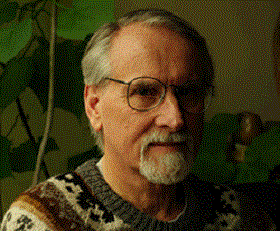
Stefaan van den Bremt (Aalst, 12 oktober 1941)
De Italiaanse dichter Eugenio Montale werd geboren in Genua op 12 oktober 1896. Zie ook mijn blog van 12 oktober 2010 en eveneens alle tags voor Eugenio Montale op dit blog.
Mittagsstunde
Verlorener Zikade
schwaches Sistrum im Wind,
kaum ertönt schon verklungen
im trägen Dunst.
Aus der Tiefe verzweigt
in uns sich die geheime
Vene; mühsam
hält sich unsre Welt.
Ein Zeichen deiner Hand:
da flimmern in der fahlen Luft
zersetzt die Spuren,
die die Leere nicht verschluckt.
Zu nichts wird dann auch Gebärde,
jede Stimme schweigt,
zu seiner Mündung steigt
hinab das kahle Leben.
Auf einen ungeschriebenen Brief
Um wimmelnder Tagesfrühen, um weniger
Fäden willen, darin der Knäuel des Lebens
sich verfängt und wieder löst
in Stunden und in Jahre, springen heut die
Delphinenpaare mit den Jungen? Oh, laß mich nichts
hören von dir, laß fliehen mich vor dem Schimmer
deiner Wimpern. Sehr andres ist auf der Erde.
Vergehen und wiederkommen: beides ist schwer.
Es zögert die rote Esse der Nacht,
lang säumt der Abend, das Gebet
ist Qual, und noch ist zwischen den ragenden
Felsen zu dir nicht gelangt die Flasche vom Meer.
Leer bricht sich die Woge
an der Spitze, in Finisterre.
Lob unserer Zeit
Nicht genug des Guten kann man sagen
von der Wichtigkeit der Welt
(der unsren, mein’ ich),
wohl der einzigen,
in der mit Kunst man töten
und Werke doch der Kunst erschaffen kann,
bestimmt für eines Morgens Dauer –
auch wenn der Morgen aus Jahrtausenden
und mehr besteht. Nein, man kann sie nie
genugsam preisen. Eile freilich
scheint geboten, denn es könnte
die Stunde nicht mehr ferne sein,
da sie im Übermaße sich wird aufgeblasen haben,
wie ein gewisser Frosch in der bekannten Fabel.
Vertaald door Herbert Frenzel
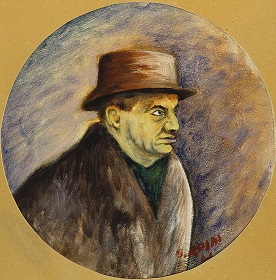
Eugenio Montale (12 oktober 1896 – 12 september 1981)
Portret door Ottone Rosai, 1941
De Amerikaanse dichter, criticus en vertaler Robert Stuart Fitzgerald werd geboren op 12 oktober 1910 in Springfield, Illinois. Zie ook alle tags voor Robert Fitzgerald op dit blog.
Counselors (Fragment)
For his retreat
The priest lifts up the monstrance, muttering
Abstracted Latin to the tinkle behind him.
Presently they will bawl the Stabat Mater.
And all those years at seminary, reading
St. Basil and Jerome, girding his cassock
For handball in the gritty cement courtyard
Under the swooping smoke of the powerhouse;
And ordination when the folks from Chicago
Wept before the bishop. Mortify
The flesh. Think on thy last end. Pray
The Holy Mother of God in her infinite mercy,
And Him who rests in the dark chapel always,
Where the wick burns in wax, a cuddling flame:
Deduced by Thomas from the tip of heaven.
Or should I tumble to the recumbent
Confessional, and the scientist of distress?
For any child the terror in the night,
The hating eyes by day may be
Death’s cunning orchestration: they prepare
The servant’s cry at last, absolute and lonely.
See this easy gentleman in tweeds,
Deepchested, a swimmer to the farthest light,
Diagnostician of the subaqueous
Faces of dreams: with patience like a lover
He must all day sustain his authority,
Must not be bored, merciful or amused.
Or the anatomist and healer of bones?
Trepanner, skilled in suturing, the masked
And sterile hero in the cone of light;
There the sweet ether cone must be inhaled
With one, two pulses of the fiery spiral
Singing into timeless speed or quiet:
A mound under a sheet, a square of pale
Mortal flesh incised in a seeping line,
Spreading its lips for pretty butchery.
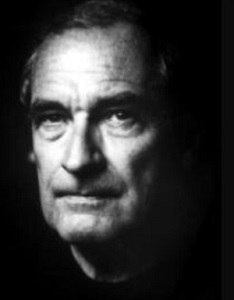
Robert Fitzgerald (12 oktober 1910 – 16 januari 1985)
De Amerikaanse dichter en schrijver Paul Engle werd geboren op 12 oktober 1908 in Cedar Rapids. Zie ook alle tags voor Paul Engle op dit blog.
Twenty Below
Twenty below, I said, and closed the door,
A drop of five degrees and going down.
It makes a tautened drum-hide of the floor,
Brittle as leaves each building in the town.
I wonder what would happen to us here
If that hard wind of winter never stopped,
No man again could watch the night grow clear,
The blue thermometer forever dropped.
I hope, you answered, for so cruel a storm
To freeze remoteness from our lives too cold.
Then we could learn, huddled all close, how warm
The hearts of men who live alone too much,
And once, before our death, admit the old
Need of a human nearness, need of touch.
American Child III
1.
EACH morning she looks up and breathes the sky
And marvels again that night and day are varied.
Breathing, she does not wonder at what cry
of woman, crow or bell that wind has carried.
Each day is an astonishment of breath
She warms by the nourished blood, yet unaware
That all the dark astonishment of death
Is merely the lung emptied of mere air.
She breathes that insubstantial element
That turns to substance: body, nerve and pain.
Yet there are days of absolute content
When all her laughter is a hollow house
Raised against sorrow and the raving rain
While she lives in it like a patient mouse.
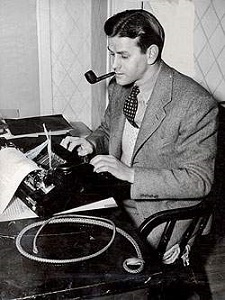
Paul Engle (12 oktober 1908 – 25 maart 1991)
In 1941
De Amerikaanse schrijfster Ann Petry werd geboren op 12 oktober 1908 in Old Saybrook, Connecticut. Zie ook alle tags voor Ann Petry op dit blog en ook mijn blog van 12 oktober 2010.
Uit: The Street
“It was like the Chandlers and their friends in Connecticut, who looked at her and didn’t see her, but saw instead a wench with no morals who WOuld be easy to come by. The reporter saw a dead Negro who had attempted to hold up a store, and so he couldn’t really see what the man lying on the sidewalk looked like. He couldn’t see the ragged shoes, the thin, starved body. He saw, instead, the picture he already had in his mind: a huge, brawny, blustering, ignorant, criminally disposed black man who had run amok with a knife on a spring afternoon in Harlem and who had. in turn been knifed.
She had gone past ‘the bakery shop again the next afternoon. The windows had been smashed, the front door had apparently been broken in, because it was boarded up. There were messages chalked on the sidewalk in front of the store. They all said the same thing: “White man, don’t come back.’ She was surprised to see that there were men still standing around, on the nearest corners, across the street.
Their faces were turned toward the store. They weren’t talking. They were just standing with their hands in their pockets – waiting.
Two police cars with their engines running were drawn up in front of the store. There were two cops right in front of the door, swinging nightSticks. She walked past, thinking that it was like a war that hadn’t got off to a Start yet, though bOth sides were piling up ammunition and reserves and were now wait- in g for anything, any little excuse, a geSture, a word, a sudden loud noise – and poufl it would start.
Lutie moved uneasily on the bed. She pulled the robe more tightly around her. All of these streets were filled with violence, she thought. You turned a corner, walked through a block, and you came on it suddenly, unexpectedly.
Or it was later in the spring that she took Bub to Roundtree Hospital. There was a cold, driving rain and she had hesitated about going out in it. But Bub had fallen on the sidewalk and cut his knee. She had come home from work to find him sitting disconsolately in Pop’s kitchen. It was a deep, nasty cut, so she took him to the emergency room at Roundtree in order to find out just how bad it was.”
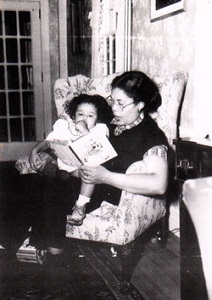
Ann Petry (12 oktober 1908 – 28 april 1997)
Hier met haar dochtertje Liz, rond 1940
De Franse schrijver Louis Hemon werd geboren op 12 oktober 1880 in Brest in Bretagne. Zie ook alle tags voor Louis Hemon op dit blog en eveneens mijn blog van 12 oktober 2010.
Uit: Maria Chapdelaine
“Un grand éclat de rire lui répondit.
– On les connaît, les cochons de la grand-race à Hormidas. Gros comme des rats, et vifs comme des écureux pour sauter les clôtures.
– Vingt-cinq cents! cria un jeune homme par dérision.
– Cinquante cents!
– Une piastre!
– Ne fais pas le fou, Jean. Ta femme ne te laissera pas payer une piastre pour ce cochon-là.
Jean s’obstina.
– Une piastre. Je ne m’en dédis pas.
Hormidas Bérubé fit une grimace de mépris et attendit d’autres enchères; mais il ne vint que des quolibets et des rires.
Pendant ce temps les femmes avaient commencé à sortir de l’église à leur tour. Jeunes ou vieilles, jolies ou laides, elles étaient presque toutes bien vêtues en des pelisses de fourrure ou des manteaux de drap épais; car pour cette fête unique de leur vie qu’était la messe du dimanche elles avaient abandonné leurs blouses de grosse toile et les jupons en laine du pays, et un étranger se fût étonné de les trouver presque élégantes au coeur de ce pays sauvage, si typiquement françaises parmi les grands bois désolés et la neige, et aussi bien mises à coup sûr, ces paysannes, que la plupart des jeunes bourgeoises des provinces de France.
Cléophas Pesant attendit Louisa Tremblay, qui était seule, et ils s’en allèrent ensemble vers les maisons, le long du trottoir de planches. D’autres se contentèrent d’échanger avec les jeunes filles, au passage, des propos plaisants, les tutoyant du tutoiement facile du pays de Québec, et aussi parce qu’ils avaient presque tous grandi ensemble.”
Louis Hemon (12 oktober 1880 – 8 juli 1913)
Affiche
De Oostenrijkse dichteres en schrijfster Paula von Preradović werd geboren op 12 oktober 1887 in Wenen. Zie ook alle tags voor Paula von Preradović op dit blog.
Uit: Die Königslegende
„Immer wenn du königlich und heldisch verfuhrst. Da du auf euren Schiffen die Narenta hinunter segeltest, da man dich krönte, da dein Knabe geboren wurde. Da war ich dir nahe, aber du sahst mich nicht …. Mich sieht nur, wer geprüft und schmerzerfahren ist”
„Warst du auch in der Schlacht an meiner Seite?”
„In der Schlacht floh ich dich, denn du warst der Unterlegene”.
„Warum hast du mir nicht geholfen. Warum hast du das Unglück nicht abgewendet?”
„Wir Vilen stärken und vermehren das Glück der Glücklichen. Unglück abzuwenden sind wir nicht gesandt”.
(…)
„Warum sagst du – böser Menschen? Weil sie anders wollten als du? Du hast erstrebt und getan, was gegen die wahren Zeichen der Zeit war. Sieh, Slavatz, ich bin unseres heiligen Vaters Benedikt von Nursia demütiger Sohn. Aber sollte man mich eines Tages doch noch auf den Thron rufen, so würde ich folgen, denn ich bin der legitime Erbe. Nicht aus Lust und Ehrsucht würde ich folgen, sondern aus Pflicht. Und dann würde ich mit Gottes Hilfe versuchen, den heiligen Willen und Brauch des Volkes, seine tiefe und wilde Liebe zu den eigenen uralten Wurzeln mit der neuen großen Ordnung zu versöhnen, die im Abendland herrscht und die auch das kroatische Volk einbeziehen will.
Wir sind keine Morgenländer. Unsere Berge und unsere Küsten blicken nach Abend. Wir gehören zur abendländischen Christenheit, dem Basileus sind wir viel zu fern.”
Und schließlich endet Stjepan mit der Conclusio, dass “unser Volk fest in der eigenen Erde wurzeln, aber nach Westen schauen muss”.
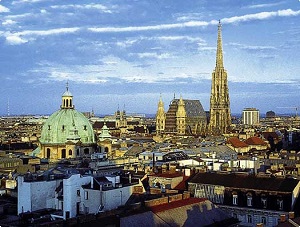
Paula von Preradović (12 oktober 1887 – 25 mei 1951)
Wenen
